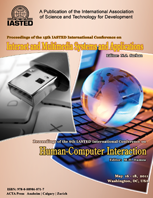The 6th IASTED International Conference on
Human-Computer Interaction
HCI 2011
May 16 – 18, 2011
Washington, DC, USA
Past Conference Information
The Human-Computer Interaction 2011 conference in Washington, DC, USA has ended.
Conference ProceedingsThe Conference Proceedings are available for purchase on the ACTA Press website: |
Scope
The topics of interest covered by HCI 2011 included, but were not limited to:
ACCESSIBILITY
- Accommodating People with Disabilities
| |
| |
- Support for Creativity and Learning
| - Universal Access and Usability
|
|
HUMAN COMPUTER INTERACTION
- Analysis, Design, and Evaluation Methods
| |
- Guidelines and Design Heuristics
| - HCI Theory, Methods, and Practice
|
| - Theoretical Foundations of HCI
|
| |
- User Modeling and Adaptation
| - User Profiling and Individual Differences between Users
|
- Visions of HCI in the Future
|
INTERFACE
| |
- Graphical User Interfaces
| |
- Interaction Devices and Tools
| - Interaction through Wireless Communication Networks
|
- Interfaces for Restricted Environments
| |
| |
- Perceptual and Adaptive User Interfaces
| - Speech and Natural Language Interfaces
|
- User Interface Development
| - User Interface Software Tools, Architecture, and Technologies
|
- Virtual and Augmented Reality
|
SOCIO-CULTURAL EFFECT
- Affective and Emotional HCI
| - Implications of Culture on Design
|
| - Psychological Aspects of HCI
|
- Societal Implications of HCI
|
APPLICATIONS
- Artificial Intelligence and Agents
| |
| - Computer Supported Cooperative Work
|
| - Human-Work Interaction Design
|
| |
- Ubiquitous and Pervasive Computing
| |




 Human-Computer Interaction
Human-Computer Interaction 


